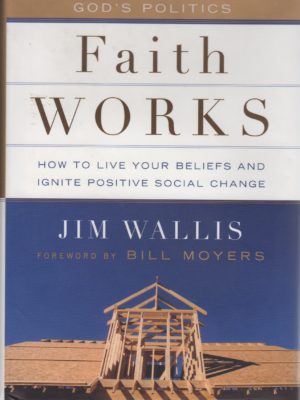
Faith Works by Jim Wallis (2000. Random House. ISBN 1-4000-6479-1)
An Evangelical friend gifted this non-fiction “handbook for Christians” a year or so back. It sat on my shelf, waiting discovery, until it became one of my bedside and bathroom reads. Because I’m a life-long Liberal Christian (yes, we still exist!), I’ve taken it upon myself to try and understand the recent election of The Orange Headed One through the eyes of my more conservative, vocal, Christian brothers and sisters. I was hoping this book would guide me to some sort of comprehension. It did not. But that’s not because the book lacks depth or quality writing or spiritual insight. Wallis’s work is filled with all of those things. But it is, at this point, eighteen years old already and sadly, written at a time when the current disaster of a president wasn’t in the picture.
Too harsh you say? I’m being too judgmental? Here’s the thing. My entire life, my biggest pet peeve is hypocrisy, the “do as I say, don’t do as I do” mentality of certain folks in power. Wallis works hard to paint a picture of the a possible unification of Christians on the right and the left by turning away from debating whether one side or the other has the keys to the kingdom, or has a clue as to WWJD (What Would Jesus Do). He reports on a then-growing movement of like-minded and stout-hearted civil rights leaders, churchmen and women, and deep thinking politicians who understood, at least back in the late 1990s, that economic disparity, racial inequality, wage inequity, and environmental instability (most often in areas inhabited by the poor) are not just political questions: they are Christian issues. His reportage, as a leader in this re-discovery of the need to blend Christian charity with governmental oversight and programming, is concise and accurate. But there is one fundamental flaw in his logic. He could not anticipate that his audience, fueled by the advance of Balkanization through politically-driven television and radio and websites, would not come together to confront the issues he raises but rather, separate farther and farther until the two sides of any big-picture argument are no longer able to talk in a common, respectful language.
I was hoping that Wallis, an acclaimed Evangelical himself, could point us all in a direction that would lead to reconciliation and healing. But despite his best efforts, that didn’t happen and in fact, seems desperately impossible. His stern warnings about Trump the candidate went unheeded by his fans and those fellow Evangelicals who believed Wallis, back when this book was written, was spot on. (See https://www.huffingtonpost.com/jim-wallis/donald-trump-narcissist-i_b_7770156.html.) And yet, here we are. We elected ( I include myself because, well, I am still an American and must live through the next three years alongside my fellow citizens who put Trump in office) a man who thinks only of himself, is a serial adulterer, denigrates women and minorities and immigrants and just about everyone who doesn’t share his white skin and his privilege, avoided military service when called, and worst of all, has no semblance of Christian charity or belief about him. Wallis tried, when he began the Sojourner Movement in the 1990s in the face of Congressional attacks on the social safety net, to bring Jesus forward, to make Him the focus of a discussion of how to improve morally as a people. I applaud his tenacity and his faith. I am only sorry that his vision of a unified approach to the biggest social and equity issues confronting our nation has led us to this.
In reading Wallis’s book, my one major criticism is that he soft sells the wide gap between Evangelicals and Liberal Christians when it comes to the issue of abortion. The topic is only marginally present along the edges and never is tackled head on. This is, in my estimation, a mistake. Until the two sides in the abortion debate can come to some sort of armistice, whereby the Right is allowed to hold fast to its belief that abortion is a moral sin but admits those who think otherwise aren’t murdering, unfeeling animals; and the Left acknowledges that abortion is a morally difficult topic and recognizes that casually denigrating those who believe abortion to be morally repugnant are ignorant, backwater boobs is wrong; none of what Wallis hopes to accomplish across the spectrum of Christianity is likely possible. My personal take is such an accommodation may once have been plausible and all sorts of Believers might have been able to agree to disagree had that dialogue taken place around the time Bill Clinton (no moral guiding light, I’ll admit) shared his belief that abortion should be “legal and safe, but rare” in 1992. Had that discussion taken place before Hannity and Maddow, perhaps Wallis’s vision might have come to pass. But that era disappeared within the whirlwind of impeachment based upon a Liberal president’s own moral failings. Absent the heavens opening and Jesus descending sometime soon to guide us out of this morass, I’m not encouraged that things are gonna change and men and women across the political divide will roll up their sleeves and do the Good Work that Wallis believes is possible.
4 stars out of 5. Trump isn’t Wallis’s burden to bear. He is ours.
Peace.
Mark
(PS One could write volumes about the disconnect between how Evangelical Christianity held its collective nose and voted for an immoral man simply because he assured them “I stand against abortion” and yet aimed its collective slings and arrows in the direction of an intelligent, honest, faithful, and thoughtful black man. But this isn’t the place…)


